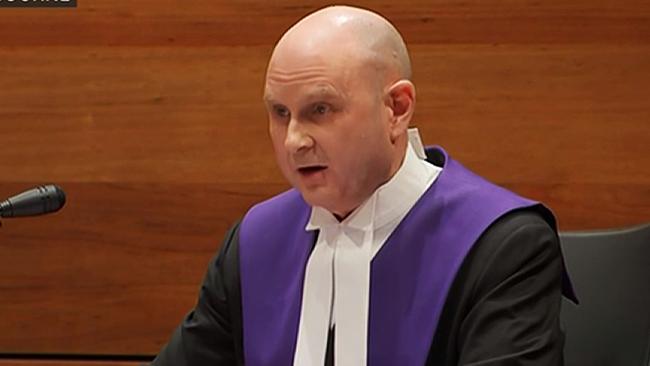‘Effectively reformed’: How judge decided George Pell’s sentence
A judge has revealed three key factors that decided Cardinal George Pell’s fate in a hour-long sentencing that had Australia captivated.
Judge Peter Kidd has revealed three key factors he considered when sentencing Cardinal George Pell to six years in prison for sexually abusing two 13-year-old boys at St Patrick’s Cathedral in 1996.
In his hour-long sentencing, Judge Kidd first read out harrowing details of the crimes committed by the 77-year-old.
When outlining Pell’s case for retribution, the judge noted that while there was “no evidence of his remorse”, the cardinal had “experienced an exceptional career within the Catholic Church”.
While victims and members of the media have reacted with outrage towards what they see as a light sentence, Judge Kidd was methodical in laying out three three key factors he considered when arriving at the six-year sentence.
1. THE CARDINAL’S AGE
Judge Kidd said Pell’s age and health status had particularly affected his decision.
“As I have indicated before, you are now in your late 70s. It is relevant in a number of ways,” he said.
“Of some real importance in my sentencing exercise is the fact that each year you spend in custody will represent a substantial portion of your remaining life expectancy.
“While it is a matter of speculation as to how long you will live, the fact is that you are of advanced years and are entering the last phase of your life.
“Like anyone in their late 70s, your health will decline in time.
“I am conscious that the term of imprisonment, which I am about to impose upon you, carries with it a real — as distinct from theoretical — possibility that you may not live to be released from prison.”
He noted Pell already had “some significant enough health issues”, including hypertension and congestive heart failure.
“Facing jail at your age in these circumstances must be an awful state of affairs for you,” the judge said.
The court imposed a non-parole period of three years and eight months.
“I will impose a shorter non-parole period than I otherwise would have been inclined to impose in recognition in particular of your age, so as to increase the prospect of your living out the last part of your life in the community,” Judge Kidd said.

2. LIKELIHOOD OF REOFFENDING
Another contributing factor was Pell’s risk of reoffending, which the Judge deemed negligible. He said Pell’s age, his “otherwise good character” and the fact he has not been convicted of such an offence in the 22 years after his crime factored into his decision.
However, he acknowledged for a second time that Pell had “shown no remorse or insight into your offending” and that there remained no explanation for it.
Based on this, the prosecution argued there was still a limited risk of reoffending, but the judge did not accept this.
“The lengthy period without offending since these matters supports my conclusion that you have effectively reformed and, as I have said, there are other matters, such as your advanced years, which persuade me that you are not a risk to the community,” Judge Kidd said.
He also acknowledged the resumption of Pell’s earlier life in the aftermath of this case was “now impossible”.
3. PELL’S ‘OTHERWISE BLAMELESS LIFE’
Judge Kidd noted Pell had no prior convictions and had not committed other sexual offences since this offending.
He added that character references submitted to the court — including one written by former prime minister John Howard — described Pell as a “compassionate” and “generous” person.
Judge Kidd also took into account the delay in the case, since the abuse occurred 22 years ago.
Acknowledging that victims of sexual abuse often did not come forward for many years, the judge said the delay had allowed Pell to lead an “otherwise blameless life”.
In his final remarks, Judge Kidd said: “Finally, sentencing is often simplistically portrayed by some in the public sphere as being an easy and uncomplicated task. From where I sit today, the exercise is far from an easy one. And it is certainly not simple.
“I am required to weigh all of the relevant matters in this case and then reach a conclusion as to a just and appropriate penalty that reflects all of the circumstances of your case, Cardinal Pell. It is not a mathematical exercise.
“This balancing exercise is inevitably unique to the specific facts and circumstances of your case.”
For crisis support, Lifeline provides a 24/7 line, as well as online resources on a range of issues affect both men and women. Call 13 11 14 or visit lifeline.org.au.
